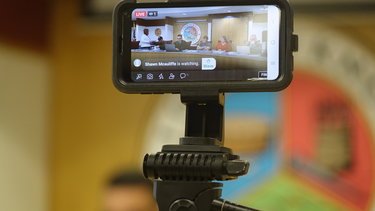Two state bills seek to reduce government opacity
ALBANY COUNTY — An assemblywoman who helped draft New York’s sunshine laws is unhappy with language that she says has let public agencies avoid compliance and so has proposed legislation to close the loopholes.
The New York State Senate and Assembly will review two bills designed to prevent local governments and other public bodies from using common manipulation tactics to prevent the dispersal of public information currently allowed by the state’s Open Meetings and Freedom of Information Laws.
One bill, introduced by Assemblywoman Amy Paulin, a Democrat who has represented a portion of Westchester County since 2001, would require public bodies to make all documents that are expected to be discussed during a public meeting available online and/or by request at least 24 hours in advance of that meeting.
The bill would also mandate that recordings of meeting broadcasts be posted to the public body’s website within five days, and be maintained there for at least five years.
The other bill, also introduced by Paulin, would prohibit Freedom of Information Law officers from charging fees for requests for documents that can be fulfilled electronically. Currently, state law permits agencies to charge 25 cents per photocopy, with room for statutes to adjust that ceiling.
Paulin explained that she had written the laws that these bills would amend and has been disappointed by reports of agencies using the current language — which in most cases restricts the requirements to “the extent practicable,” leaving the determination in the hands of the agency receiving the request — to slow down the FOIL process unduly. She spoke at a press conference held on March 15 with the New York Coalition for Open Government, an open-government watchdog based in western New York.
Paulin said, in drafting the original law, she had been reluctant to include the vague language, persuaded only by the argument that it would prevent agencies from becoming overwhelmed by complicated demands.
“Instead,” Paulin said, “it’s been used as a way to evade the law because … there can’t be that many times where it’s not practical to make those documents available. And the reason we want to have those documents available is because the public is smart. The public can offer insightful views that can help steer the public process in a positive way … Now that we know public officers are evading [the law], the bill has to change.”
In 2019, the Coalition for Open Government conducted an informal study of the responsiveness of 16 municipalities in Erie and Niagara Counties by submitting Freedom of Information Law requests for emails sent within a four-week period by or to each municipality’s top elected official (for example a town supervisor or mayor) that pertained to government business.
Thirteen of the 16 municipalities acknowledged the request within five days, as required by law, and only eight fulfilled the request, not including the town of Hamburg, which charged $600 for the effort — a figure the report calls an “outrageous.” Those responses took anywhere from one day to 65, for an average of 33 days.
Locally, Berne Town Clerk Anita Clayton, a Democrat, has been criticized by other Democrats for her perceived lack of responsiveness since the town board came under Republican control last year, taking multiple days to transmit electronic files and meeting documents. Clayton has defended herself by explaining that she reviews all requests with the town’s attorney and establishes a respond-by date she feels is reasonable according to her total workload.
Another study by the coalition found that public bodies only sporadically post meeting documents online before a meeting.
“Thirty-five of villages of the 20 we looked at weren’t even posting a meeting agenda,” said coalition president Paul Wolf, at the March 15 press conference. “People had no idea what was even on the agenda. And then 70 percent weren’t posting meeting documents.”
Paulin, who once led a chapter of the League of Women Voters, said she used to monitor her county’s board meetings in that capacity, where access to documents was “very much a problem.”
“I would be physically at the meeting and I wasn’t given a copy of the material,” Paulin said. “Not only could you not follow along, you couldn’t tell what was being discussed, what information they were talking about, or any of that.”
Of the timeline for the bills, Paulin said that, because the state legislature is currently wrapped up in the budget process — the budget is due April 1 — the bills won’t likely be reviewed until later this year.
Nevertheless, Paulin said she’s “looking forward to pushing them hard and trying to get them passed this session.”



